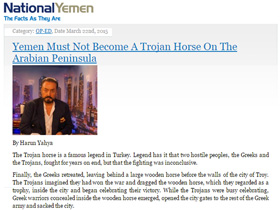
The Trojan horse is a famous legend in Turkey. Legend has it that two hostile peoples, the Greeks and the Trojans, fought for years on end, but that the fighting was inconclusive.
Finally, the Greeks retreated, leaving behind a large wooden horse before the walls of the city of Troy. The Trojans imagined they had won the war and dragged the wooden horse, which they regarded as a trophy, inside the city and began celebrating their victory. While the Trojans were busy celebrating, Greek warriors concealed inside the wooden horse emerged, opened the city gates to the rest of the Greek army and sacked the city.
Events in Yemen today are reminiscent of that legendary war in Anatolia many thousands of years ago. However, there is no wooden horse in Yemen, because efforts are being made to turn Yemen itself into one. The sides in Yemen are also unclear, unlike those in the legend of Troy; there, the two sides were the Greeks and the Trojans, while there are numerous sides in Yemen. There are those fighting directly and those acting as their guardians.
The sides directly in the war include the Houthis, forces loyal to President Hadi, the Southern Movement, the Muslim Brotherhood and al-Qaeda. There are also those behind them acting as their guardians, such as Iran on one side and Saudi Arabia on the other, the Gulf countries, the U.S. and even Europe. It is unclear which side will come out on top, but as the struggle turns into all-out war it is clearly Yemen that will lose.
Yemen has for a long time been quite poor and with a weak state. The damaging effect of the war is now making living conditions in the country even more difficult. The Houthis, using increases in fuel prices and maladministration as a pretext for rebellion, have caused worse damage than the price hikes and maladministration ever did as their objections have turned into a civil war. Looking for a solution to that damage, the Houthis received support from Iran.
That support became clear at a press conference given on March 1st by Saleh Ali al-Sammad, head of the Ansar Allah movement’s political council, following a visit to Iran.
As well as its political difficulties, Yemen also has a serious energy problem and the already inadequate energy plants in the country are frequently sabotaged. That further increases the cost paid by the civilian population in that climate of conflict.
Iran’s decision to supply fuel for a year and build a 165-megawatt power station running on gas and diesel oil and assume responsibility for the maintenance work on the current generating plant in the province of Marib and repair the Marib-Sana’a power transmission line represents one of the few positive developments in Yemen.
Iranian support is not limited to this: Sammad reported that the agreement reached with Iran also includes Iran sending a technical team to Yemen to investigate the feasibility of a project to build 1,200-megawatt power stations in the port city of Mocha attached to Taiz governorate, Aden and Hodeidah, as well as expanding the port of Hodeidah and improving collaboration between the countries on the subject of maritime transportation and the provision of credits for purchases of machinery and goods.
In order for this support and investment to have a positive impact on Yemen, great care needs to be taken over two matters. The first is that the assistance and support program must not be restricted to the area under Houthi control. The other is that the investment and support must not be sabotaged by those opposed to the Houthis.
If these conditions can be met, that will make it easier to establish constructive dialogue between the sides and will, to some extent, improve matters for the Yemeni people, whose position is worsening. All the sides - who take every opportunity to claim they are acting in the name of Islam - must stop arming themselves and fighting one another at once.
Both the Houthis and the Sunnis, who regard them with hostility, must not forget that a conception based on a unity of belief and common values lies at the heart of Islamic values, rather than division and dispute. Muslims must support one another in alliance and be tolerant and understanding, even when they disagree.
All Muslims in Yemen should greet and talk to one another. They must be tolerant of one another. Sectarian or tribal disagreements must come to an end. And all Muslims must work together, in tolerance and humility, to draw closer to God and perform greater service for His faith. They must also not forget this commandment of God’s:
“Hold fast to the rope of God all together, and do not separate. Remember God’s blessing to you when you were enemies and He joined your hearts together so that you became brothers by His blessing. You were on the very brink of a pit of the fire and He rescued you from it. In this way God makes His signs clear to you, so that hopefully you will be guided.” (Surah Al ‘Imran, 103)
Adnan Oktar's piece on National Yemen:
http://nationalyemen.com/2015/03/22/yemen-must-not-become-a-trojan-horse-on-the-arabian-peninsula/


